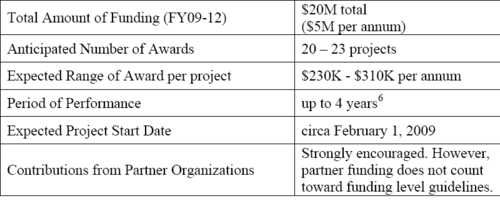Difference between revisions of "Air Quality Trend Analysis"
| Line 1: | Line 1: | ||
The Air Quality program facilitates the application of Earth Science satellite products and models to air quality management and policy issues, particularly issues associated with the implementation of air quality standards, policy, and regulation for environmental, | The Air Quality program facilitates the application of Earth Science satellite products and models to air quality management and policy issues, particularly issues associated with the implementation of air quality standards, policy, and regulation for environmental, | ||
economic, and human welfare. The program is organized around five themes: Air Quality Planning, Compliance, Forecasting, Emissions Inventories, and Climate. | economic, and human welfare. The program is organized around five themes: Air Quality Planning, Compliance, Forecasting, Emissions Inventories, and Climate. | ||
| + | |||
| + | |||
| + | * Proposal Part 1/NOI - due June 17 | ||
| + | * Proposal Part 2 - due August 13 | ||
==[http://nspires.nasaprs.com/external/viewrepositorydocument/cmdocumentid=129397/ROSES2008_Amend3.pdf Air Quality Trend Analysis and Forecasting]== | ==[http://nspires.nasaprs.com/external/viewrepositorydocument/cmdocumentid=129397/ROSES2008_Amend3.pdf Air Quality Trend Analysis and Forecasting]== | ||
Revision as of 11:53, April 9, 2008
The Air Quality program facilitates the application of Earth Science satellite products and models to air quality management and policy issues, particularly issues associated with the implementation of air quality standards, policy, and regulation for environmental, economic, and human welfare. The program is organized around five themes: Air Quality Planning, Compliance, Forecasting, Emissions Inventories, and Climate.
- Proposal Part 1/NOI - due June 17
- Proposal Part 2 - due August 13
Air Quality Trend Analysis and Forecasting
The Program solicits proposals to use Earth science products to improve air quality decision support systems. The program encourages proposals that contribute to air quality state and forecasting advisories for the public interest. The program also encourages proposals involving systems that retrospectively determine air quality compliance and trends to assess policy accountability (and the decision making activities based on these analyses). Examples of possible products might include (but not limited to) OMI NO2, aerosol products (MODIS, MISR, CALIPSO, OMI), CO (MOPITT, TES, AIRS), and products from GOES, foreign satellites (e.g., Metop-1, Envisat), upcoming planned NASA satellites, and model analyses.
In addition, proposal teams can address issues associated with long-range transport in each of these areas. The program encourages proposals involving multiple Regional Planning Organizations, major regional or national associations, private companies, and/or federal agencies. The program encourages proposals to use international satellite products (e.g., Metop, Envisat) in conduction with NASA and US Earth science products. Proposals should address how the proposed project will benefit the Air Quality community and public beyond the immediate life of A-train sensors.
Data Sensor, Method, Monitoring
- Warren White, UC Davis, Aerosols
- Lorrie Ramer, Cristiana Chu, NASA, Satellite
- Torres, NASA OMI Aerosol
- Harvard... OMI NO2
Data System
- Stefan Falke, NGC, WashU
- Greg Leptoukh, NASA
Data Analysis
- Jack Fishman, NASA
- Rich Poirot, Vermont State
- Donna Kenski, LAdCo
- Bret Shichtel, NPS
Data Applications; Decisions
- Neil Frank, EPA
- John Backmann, Consultant
- Terry Keating
